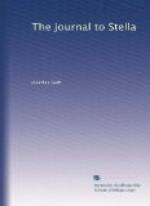I am come here after six days. I set out on Monday last, and got here to-day about eleven in the morning. A noble rider, fais! and all the ships and people went off yesterday with a rare wind. This was told me, to my comfort, upon my arrival. Having not used riding these three years, made me terrible weary; yet I resolve on Monday to set out for Holyhead, as weary as I am. ’Tis good for my health, mam. When I came here, I found MD’s letter of the 26th of May sent down to me. Had you writ a post sooner I might have brought some pins: but you were lazy, and would not write your orders immediately, as I desired you. I will come when God pleases; perhaps I may be with you in a week. I will be three days going to Holyhead; I cannot ride faster, say hat oo will. I am upon Stay-behind’s mare. I have the whole inn to myself. I would fain ’scape this Holyhead journey; but I have no prospect of ships, and it will be almost necessary I should be in Dublin before the 25th instant, to take the oaths;[2] otherwise I must wait to a quarter sessions. I will lodge as I can; therefore take no lodgings for me, to pay in my absence. The poor Dean can’t afford it. I spoke again to the Duke of Ormond about Moimed for Raymond, and hope he may yet have it, for I laid it strongly to the Duke, and gave him the Bishop of Meath’s memorial. I am sorry for Raymond’s fistula; tell him so. I will speak to Lord Treasurer about Mrs. South[3] to-morrow. Odso! I forgot; I thought I had been in London. Mrs. Tisdall[4] is very big, ready to lie down. Her husband is a puppy. Do his feet stink still? The letters to Ireland go at so uncertain an hour, that I am forced to conclude. Farewell, MD, MD MD FW FW FW me me me me.
Lele lele lele logues and Ladies bose fair and slender.
[On flyleaf.]
I mightily approve Ppt’s project of hanging the blind parson. When I read that passage upon Chester walls, as I was coming into town, and just received your letter, I said aloud—Agreeable B-tch.
NOTES.
These notes are referenced by ‘Notes to the Introduction’ or ’Letter (number)’, and the numbers in square brackets (thus — [3]) in the body of the Journal.
Notes to the Introduction.
1 Notes and Queries, Sixth Series, x. 287.
2 See letter from Swift to John Temple, February 1737. She was then “quite sunk with years and unwieldliness.”
3 Athenaeum, Aug. 8, 1891.
4 Journal, May 4, 1711.
5 Craik’s Life of Swift, 269.
6 Unpublished Letters of Dean Swift, pp. 189-96.
7 In 1730 he wrote, “Those who have been married may form juster ideas of that estate than I can pretend to do” (Dr. Birkbeck Hill’s Unpublished Letters of Dean Swift, p. 237).




